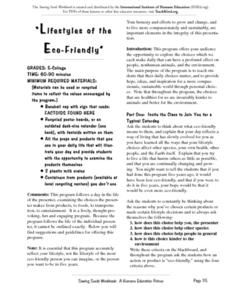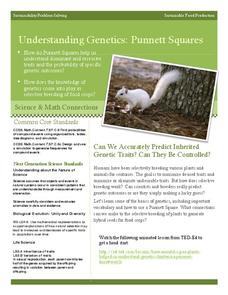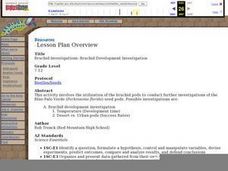Rainforest Alliance
My Forest or the Rainforest?
The differences between tropical and temperate rainforests range from animals and flowers to climate and landscapes. Kindergarteners compare and contrast characteristics of their local forest to a tropical rainforest.
New South Wales Department of Education
Plant Groups
Bryophytes can grow in temperatures just above zero degrees. This 17th installment in a series of 20 introduces learners to the five groups of plants: algae, bryophytes, pteridophytes, gymnosperms, and angiosperms. Classes then explore...
Cornell University
Weed IPM
Go on a weed hunt! Scholars gain insight into the characteristics of plants and examine the outdoor environment in order to identify five different types of weeds. Learners then show what they know with a one-page reflection.
Cold Spring Harbor Laboratory
Genetic Inheritance Follows Rules
Rules are not meant to be broken in genetics. Scholars learn to build Punnett squares to track the inheritance of dominant and recessive traits in an interactive animation activity. Online questions help individuals reflect on their...
Cold Spring Harbor Laboratory
Genes Don't Blend
Yellow and blue make green—unless you're studying the inheritance of genetic traits. An interactive lesson explains the difference between blended traits and pure traits and gives examples of their occurrence. The resource includes a...
Curated OER
Lifestyles of the Eco-Friendly
A helpful worksheet encourages pupils to make environmentally-friendly choices at home. The packet presents many ways that learners can help the environment, such as taking shorter showers in order to conserve water.
Curated OER
Nuts for Peanuts: Peanut Plants, Peanut Timeline, and Peanut-s-timation!
Students complete a timeline. In this peanuts instructional activity, students read A Short Peanut History and use this resource to make a timeline of the history of the peanut. Students can grow peanuts in the classroom or make various...
Curated OER
Fall 2003 Midterm Exam #3
Let there be light! When your physics learners take this midterm exam, light will be their focus. They will show what they know about electromagnetic waves, interference, refraction, reflection, lenses, prisms, and more! The test is...
Curated OER
Pollination Power
Second graders study and examine the structure of a flower. In this pollination lesson, 2nd graders observe pollinators in the garden and dissect a flower. Students then plant strawberry plants in the garden and observe the process of...
Curated OER
Forest Ecosystems
Forests are briefly defined and broken down into four different types in this PowerPoint. Facts and photos are provided for each type, including: deciduous, tropical rain, coastal, and coniferous forests. This is a wonderful presentation...
Curated OER
Investigating the Effect of Minerals on Plant Growth
How do different minerals affect the growth of plants? Budding botanists find out in a multi-week experiment that has them using solutions with specific mineral deficiencies. While there is a lot of preparation for the investigation,...
It's About Time
Photosynthesis, Respiration, and the Carbon Cycle
Provide your class with the opportunity to view our carbon cycle close up. Young scientists research the cycle of oxygen as it completes the tasks of photosynthesis and respiration. They explore the importance of carbon in an ecosystem...
NASA
Newton Car
If a car gets heavier, it goes farther? By running an activity several times, teams experience Newton's Second Law of Motion. The teams vary the amount of weight they catapult off a wooden block car and record the distance the car...
Western Kentucky University
Understanding Genetics: Punnett Squares
Can scientists really predict genetic outcomes or are they simply making a lucky guess? Scholars first learn about Gregor Mendel and how to make Punnett squares. Then they extract DNA from a strawberry in a lab with included conclusion...
Curated OER
Bruchid Investigations: Bruchid Development Investigations
While this lesson plan is based on the Bruchid beetle, the focus is on conducting a scientific investigation. Ecology explorers vary the temperature or the type of leaf that Bruchid eggs are laid on and test for effects on the...
Curated OER
Genetically Modified Food (GMF)
Explore genetically modified foods through various experiments. In this biology lesson, students discuss the safety issues related to GMF's. They conduct a PCR analysis to identify the presence of genetic modification.
Curated OER
Measurement and Variation
Examine the concept of variation through observation and measurement. Middle schoolers will study a peanut and record any distinguishing characteristics visible as well as sketch their peanuts and describe them in writing. Their peanut...
Curated OER
Beans and Baleen
Predict whale populations using different beans as whales! Learners observe different types of beans in a dish knowing that each bean represents a different kind of whale. They then predict how many "whales" there are in a certain area....
Curated OER
Owls: Top of a Food Chain
Although written for middle schoolers, there is no reason that a 3rd, 4th, or 5th grader could not also learn about food chains through the dissection of owl pellets. After you introduce the topic, learners complete an owl research...
Curated OER
Animal Science as Agriculture
The methods by which farming and agriculture became a valid area of study and research are detailed in this PowerPoint. Also presented are the steps involved for improving productivity and efficiency. The use of scientific method and...
Science Matters
Blubber Gloves: It’s All About Insulation
Instill the concept of adaptation with the help of Blubber Gloves—ziplock bags, shortening, and duct tape. Scholars discuss how animals and plants keep warm in polar regions, record their predictions, and try on their Blubber Gloves to...
Curated OER
Let's Learn About Plants!
Students discover different plants and plant parts by observing their campus. In this plant life lesson, students take a guided walk around their school with a magnifying glass examining everyday plants as well as photographing them....
Curated OER
Pumpkins
Observe the differences between the inside and outside of a pumpkin. Learners discuss what pumpkins are used for and then view a pumpkin. Next, they view the inside of the pumpkin and draw the differences they see.
Curated OER
Evidence of Evolution by Natural Selection: Testable Hypotheses #2
These slides will activate prior knowledge with real-life examples of natural selection. The predictions and outcomes for those examples are explained. Your students will like the information about the relevant chromosome tests that can...

























